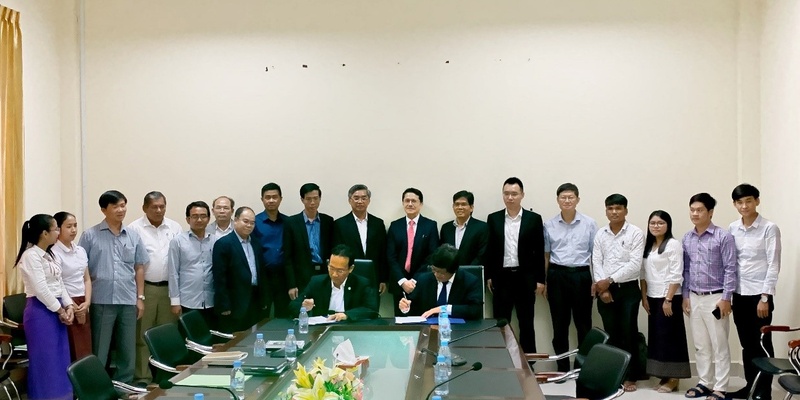Hand-in-hand to strengthen Phytosanitary Capacity in Cambodia to combat Banana Fusarium wilt and facilitate safe trade
Posted on Wed, 13 Nov 2019, 08:59

A historical moment: signing the MoU between the FAO on behalf of the IPPC Secretariat and the MAFF of Cambodia on behalf of the GDA. © IPPC Secretariat.
8 November 2019, Phnom Penh, Cambodia – The IPPC delegation carried out a field trip to Cambodia from 4 to 8 November 2019 so as to set up the pilot site of the IPPC global project on phytosanitary capacity development in Cambodia. The delegation was composed of Mr Jingyuan Xia, IPPC Secretary, Mr Xiaoliang Wang, IPPC Phytosanitary Consultant, and Mr Kexian Yi, Director of Environment and Plant Protection Institute of Chinese Academy of Tropical Agricultural Sciences.
The main activities of the IPPC delegation were: i) held a meeting with representatives from General Directorate of Agriculture (GDA), Ministry of Agriculture, Forestry and Fisheries (MAFF) of Cambodia, and the FAO Cambodian office to discuss why, what and how to implement the IPPC global project on phytosanitary capacity development in Cambodia; ii) paid a field visit to the upland crop research station and some commercial banana plantations in Kampong Chan Province to make a survey on the major problems of banana production and protection; and iii) made a final decision about setting pilot sites to combat banana Fusarium wilt and facilitate safe trade.
The significant moment about this mission was the official signing of a Memorandum of Understanding (MoU) between the FAO on behalf of the IPPC Secretariat and the MAFF of Cambodia on behalf of the GDA. Following the signing of the MoU, the first working meeting on implementation of the IPPC pilot project in Cambodia was held in GDA-MAFF, which was chaired by the IPPC Secretary, Mr. Xia. Through the working meeting, an IPPC-Cambodian Steering Committee on the pilot project was established; a Working Group on the pilot project was formulated; and the three-year work plan on the pilot project (2019-2021) was agreed including three core activities as follows:
-
Facilitate the Cambodian NPPO to conduct Phytosanitary Capacity Evaluation (PCE);
-
Organize training courses on phytosanitary measures and IPM technologies to combat Banana TR1 and TR4; and
-
Set up field demonstrations of the Chinese new technologies on Banana IPM to promote its production and trade.
With all these efforts to be made, it is expected that Cambodian NPPO would improve its entire phytosanitary system and acquire new technologies to combat Banana TR1 to get a high yield for local small-scale famers and to set up a surveillance system to keep Cambodia free from Banana TR4 to promote its safe trade.
Background information: The IPPC Secretariat is implementing a USD 2 million project entitled “Strengthening the Capacity of Developing Contracting Parties to Implement the IPPC and its standards under FAO-China South-South Cooperation (SSC) programme” (GCP /INT/291/CPR). The main purpose of this project is to strength phytosanitary capacity of developing countries through sharing experience and lessons learned from China. The project also requests to set up some pilot sites for demonstrating some new technologies and products related to plant health from China. Cambodia has been selected as one of the two pilot countries for the project.



